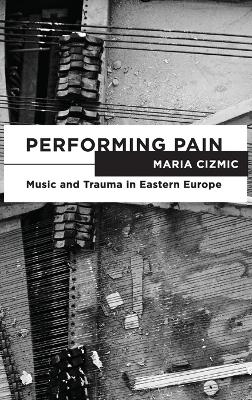
Performing Pain
Music and Trauma in Eastern Europe
Seiten
2012
Oxford University Press Inc (Verlag)
978-0-19-973460-3 (ISBN)
Oxford University Press Inc (Verlag)
978-0-19-973460-3 (ISBN)
Performing Pain considers how musical works by late 20th-century avant-garde composers engage with Cold War memory and suffering in 1970s and 80s Eastern Europe. Drawing upon an interdisciplinary range of sources, Maria Cizmic explores how people employ music in order to make sense of historical trauma and loss.
Again and again people turn to music in order to assist them make sense of traumatic life events. Music can help process emotions, interpret memories, and create a sense of collective identity. While the last decade has seen a surge in academic studies on trauma and loss in both the humanities and social sciences, how music engages suffering has not often been explored. Performing Pain uncovers music's relationships to trauma and grief by focusing upon the late 20th century in Eastern Europe. The 1970s and 1980s witnessed a cultural preoccupation with the meanings of historical suffering, particularly surrounding the Second World War and the Stalinist era. Journalists, historians, writers, artists, and filmmakers repeatedly negotiated themes related to pain and memory, truth and history, morality and spirituality both during glasnost and the years prior. In the copious amount of scholarship devoted to cultural politics during this era, the activities of avant-garde composers stands largely silent.
Performing Pain considers how works by Alfred Schnittke, Galina Ustvolskaya, Arvo Pärt, and Henryk Górecki musically address contemporary concerns regarding history and suffering through composition, performance, and reception. Drawing upon theories from psychology, sociology, literary and cultural studies, this book offers a set of hermeneutic essays that demonstrate the ways in which people employ music in order to make sense of historical traumas and losses. Seemingly postmodern compositional choices--such as quotation, fragmentation, and stasis--provide musical analogies to psychological and emotional responses to trauma and grief. The physical realities of embodied performance focus attention on the ethics of pain and representation while these works' inclusion as film music interprets contemporary debates regarding memory and trauma. Performing Pain promises to garner wide attention from academic professionals in music studies as well as an interdisciplinary audience interested in Eastern Europe and aesthetic articulations of suffering.
Again and again people turn to music in order to assist them make sense of traumatic life events. Music can help process emotions, interpret memories, and create a sense of collective identity. While the last decade has seen a surge in academic studies on trauma and loss in both the humanities and social sciences, how music engages suffering has not often been explored. Performing Pain uncovers music's relationships to trauma and grief by focusing upon the late 20th century in Eastern Europe. The 1970s and 1980s witnessed a cultural preoccupation with the meanings of historical suffering, particularly surrounding the Second World War and the Stalinist era. Journalists, historians, writers, artists, and filmmakers repeatedly negotiated themes related to pain and memory, truth and history, morality and spirituality both during glasnost and the years prior. In the copious amount of scholarship devoted to cultural politics during this era, the activities of avant-garde composers stands largely silent.
Performing Pain considers how works by Alfred Schnittke, Galina Ustvolskaya, Arvo Pärt, and Henryk Górecki musically address contemporary concerns regarding history and suffering through composition, performance, and reception. Drawing upon theories from psychology, sociology, literary and cultural studies, this book offers a set of hermeneutic essays that demonstrate the ways in which people employ music in order to make sense of historical traumas and losses. Seemingly postmodern compositional choices--such as quotation, fragmentation, and stasis--provide musical analogies to psychological and emotional responses to trauma and grief. The physical realities of embodied performance focus attention on the ethics of pain and representation while these works' inclusion as film music interprets contemporary debates regarding memory and trauma. Performing Pain promises to garner wide attention from academic professionals in music studies as well as an interdisciplinary audience interested in Eastern Europe and aesthetic articulations of suffering.
Maria Cizmic is Assistant Professor of Humanities, University of South Florida
Table of Contents ; Note on Transliteration and Translation ; About the Companion Website ; Introduction ; Musical Ways of Bearing Witness ; Chapter 1 ; Music of Disruption: Collage and Fragmentation as an Expression of Trauma in Alfred Schnittke's Concerto for Piano and Strings ; Chapter 2 ; Hammering Hands: Galina Ustvolskaya's Piano Sonata No. 6 and a Hermeneutic of Pain ; Chapter 3 ; Witnessing History during Glasnost: Arvo Part's Tabula Rasa as Musical Testimony in Tengiz Abuladze's Repentance ; Chapter 4 ; Music, Mourning, and War: Gorecki's Third Symphony and the Politics of Remembering ; Epilogue ; Bibliography ; Notes ; Index
| Zusatzinfo | 12 halftones and 20 musical examples |
|---|---|
| Verlagsort | New York |
| Sprache | englisch |
| Maße | 239 x 163 mm |
| Gewicht | 476 g |
| Themenwelt | Kunst / Musik / Theater ► Musik ► Klassik / Oper / Musical |
| Kunst / Musik / Theater ► Musik ► Musiktheorie / Musiklehre | |
| Kunst / Musik / Theater ► Musik ► Pop / Rock | |
| Geschichte ► Allgemeine Geschichte ► Zeitgeschichte | |
| ISBN-10 | 0-19-973460-7 / 0199734607 |
| ISBN-13 | 978-0-19-973460-3 / 9780199734603 |
| Zustand | Neuware |
| Haben Sie eine Frage zum Produkt? |
Mehr entdecken
aus dem Bereich
aus dem Bereich
Gewalt, Umwelt, Identität, Methode
Buch | Softcover (2024)
Spector Books OHG (Verlag)
36,00 €
wie Freud im Kollektiv verschwand
Buch | Hardcover (2024)
Klett-Cotta (Verlag)
25,00 €


